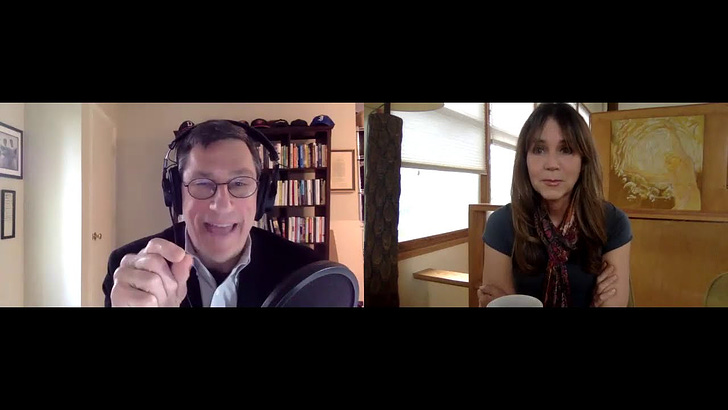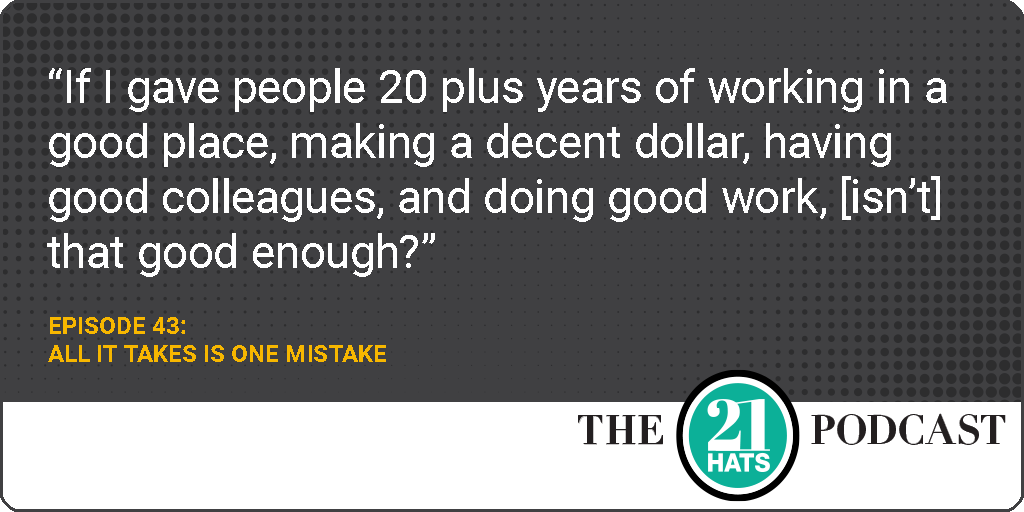
Saving Stuckey’s
W.S. Stuckey Sr. used to franchise his road stops to couples who would live in the stores. Now his granddaughter is trying to recapture some, but not all, of the original pecans-and-kitsch flavor.
Today’s Highlights
How Slutty Vegan became a cultural phenomenon. The new PPP proposal would fix the tax-deductibility issue. And what can you buy at a dead mall?
THE 21 HATS CONVERSATION
The teal blue roofs of Stuckey’s road stops once rivaled the Golden Arches. Times changed, the Stuckey family sold the business, and the chain fell into decline. Then, about a year ago, Stephanie Stuckey, granddaughter of the founder, bought the business back. In this 21 Hats Conversation, Stephanie talks about how the business grew to 368 stores in more than 40 states, why the family sold it, what went wrong under the new owners, why she bought the business back, and how she plans to breathe new life into the legacy brand.
OPPORTUNITIES
In Atlanta, Pinky Cole’s restaurant, Slutty Vegan, has become a cultural phenomenon—and a pandemic success story: “Her restaurant's mission to make plant-based comfort food ‘cool’ has gained surprising traction in Atlanta--even as only 25 percent of her customers are vegan themselves. Community is key to its strategy: The company has Black culture baked into its business model, including an affiliation with the nonprofit Pinky Cole Foundation, which aims to promote economic growth and education in communities of color.”
“Slutty Vegan is projecting sales of $5 million to $7 million in 2020, up 145 percent from last year.”
“You can order a maximum of two burgers per person. The long wait and limited tabs are heretical for many restaurants, but at Slutty Vegan, they're part of the brand as scarcity marketing increases the appeal.”
“You'll interact with staffers who keep you comfortable and energized—while affectionately cursing at you (‘Hey, sluts!’)—during your wait.” READ MORE
PPP LOANS
In the latest proposal, a second round of PPP features promising improvements: ”The refundable loan program is on track to get about $300 billion, which includes the $138 billion left over from the Cares Act. That money is widely expected to be available to first-time PPP borrowers, as well as previous recipients who experienced significant revenue losses tied to the pandemic and resulting business closures. Should the latest bill adopt the legislative language that the ‘problem-solvers’ caucus put forward on Monday, the small business relief doesn't stop there.”
“The Small Business Administration's flagship 7(a) loan program could see loan-size maximums increase to $10 million.”
“The biggest deal for many existing borrowers will be the new forgiveness protocols, which would be dramatically eased for the smallest debtors. Those with loans of less than $150,000 would be asked to submit a new (still to come) one-page forgiveness form with their lender.”
“This bill says PPP expenses are deductible, as was the original intent of the Cares Act, says Bill Smith, managing director for CBIZ MHM's National Tax Office in Bethesda, Maryland.” READ MORE
MARKETING
Novelty Oreos have a stealth purpose: “Since releasing the Birthday Cake Oreo in 2012 to celebrate the 100th anniversary of its signature cookie, Oreo has introduced 65 flavors, including, in the last three years alone, Hot Chicken Wing Oreos, Wasabi Oreos, Crispy Tiramisù Oreos and Carrot Cake Oreos. (Certain flavors are only available in specific markets; the Wasabi and Hot Chicken Wing Oreos were released in China.) ... Novelty Oreos sell reasonably well. According to Nielsen, sales of flavored, seasonal and other novelty Oreos were up over 12 percent over the last three years. But the sales are not the point.”
“Novelty Oreos, according to Mr. Parnell, play a much purer role: They help drive consumers back to milk’s alleged favorite, the 108-year-old paterfamilias, the plain old Oreo. In other words, the new flavors function as advertisements for the original.”
“And it seems to work. In the time that sales were up 12 percent for novelty flavors, sales of the classic were up almost 22 percent, according to Nielsen.” READ MORE
RETAIL
Retail sales fell in November as U.S. shoppers pulled back: “The November and October drops marked the end of several months of growth in retail spending after sharp declines earlier this year when the coronavirus pandemic triggered widespread business closures. ‘Anywhere there’s crowds people stayed away from,’ said Joshua Shapiro, chief U.S. economist at consulting firm Maria Fiorini Ramirez Inc. ‘It underscores the difficulty here till the vaccine is widely distributed.’” READ MORE
What can you buy at a dead mall? “While a relatively new phenomenon, public liquidation auctions of shopping malls are on track to become more common. The coronavirus gutted retail sales, but malls were already in trouble; in the United States, 25 percent of enclosed malls (of which there are 1,200) could close in the next five years. Two weeks ago, in Phoenix, auctioning began at the vacant Metrocenter mall, which closed in June, and will continue on a weekly basis through January. By then, the auctioneers expect to have listed about 1,000 lots.”
“So far their catalog has included a collection of 37 fire extinguishers (sold for $140); a neon Wetzel’s Pretzels sign ($750); a large mall directory ($275); a security system of cages so large they can only be described as multi-human size ($325).”
“Upcoming items include 25 food court tables; the plexiglass bins that held candy in a candy store; the contents of an empty Victoria’s Secret; a lot of nine mannequin torsos (six female, three male).” READ MORE
THE COVID ECONOMY
On a commercial strip in Brooklyn, 32 businesses have closed since the crisis hit—but 37 have opened or are preparing to open: “In October, Duwaine Harris opened Stella’s, a Caribbean restaurant on Brooklyn’s Fifth Avenue. The chef was collecting unemployment but, because of his frequent contact with his mother, the restaurant’s namesake, was wary of being called back into a crowded kitchen and endangering her health. ‘I can’t go back and work for anybody,’ Mr. Harris told his wife in the kitchen of their Bronx apartment. A good deal from the landlord, kitchen equipment left behind by the previous tenant and money cobbled together from family members, credit cards, the couple’s savings and a loan from a Covid-19 relief program, put Stella’s in business.”
“Many of those opening businesses felt like taking the risk was their best option. ‘We had hit bottom,’ Mr. Harris said. ‘There was nowhere to go but up.’” READ MORE
Sweden’s lax Covid policy is coming under renewed criticism: “With a daily average of over 6,000 new cases over the past week, hospitals in virtually all of the country are under strain, Ann Söderström, Sweden’s director of health and medical care, told reporters Tuesday. In Stockholm, hospitals have nearly twice as many Covid-19 patients as they do intensive-care beds, said Bjorn Eriksson, the city’s health and medical care director. On Monday, the country’s statistics agency said Sweden recorded 8,088 deaths from all causes last month, the second-deadliest month for the country of 10 million in its modern history, eclipsed only by the Spanish Flu pandemic of 1918.”
“Early on, Sweden hoped the virus would spread chiefly among the young and healthy, creating herd immunity with minimal deaths.”
“The increase in deaths and hospitalizations has already forced Sweden to set aside a policy of using voluntary measures to contain the virus, a strategy that has drawn global interest.”
“By contrast, most European countries have used lockdowns and mandatory restrictions to contain the virus this year.” READ MORE
CLIMATE
Russia may be a big beneficiary of climate change: “Twenty years ago, Dima says, the spring thaw came in May, but now the ground is bare by April; rainstorms now come stronger and wetter. Across Eastern Russia, wild forests, swamps and grasslands are slowly being transformed into orderly grids of soybeans, corn and wheat. It’s a process that is likely to accelerate: Russia hopes to seize on the warming temperatures and longer growing seasons brought by climate change to refashion itself as one of the planet’s largest producers of food.” READ MORE
THE 21 HATS PODCAST
Episode 43: All It Takes Is One Mistake: This week, in our final podcast of the year, Paul Downs, Jay Goltz, and William Vanderbloemen discuss the impact this year has had on their businesses and on themselves. William talks about the positive side of having to get back to a startup mentality: “It's definitely been a silver lining in the middle of a very dark cloud.” Paul talks about hoping he can offer his employees a good place to work for as long as possible: “I can give them probably another 10 years. And then beyond that, I don't know what will happen.” And Jay talks about the mistake he made that could have been fatal: “If I wouldn't have gotten the PPP money, I don't know…”
You can subscribe to The 21 Hats Podcast wherever you get podcasts.
You can also click on the button below to listen to the podcast or read a transcript.
Reply to this email if you have comments or questions for the podcast regulars.










